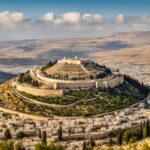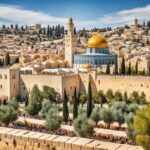Discover the rich history and spiritual significance of Shechem in the Bible. Located in present-day Nablus in the West Bank, Shechem is mentioned 60 times in the Bible and holds a pivotal role in biblical narratives. From Abraham’s first campsite in Canaan to Jesus’ conversation with the Samaritan woman, Shechem’s importance is undeniable.
Key Takeaways:
- Shechem is an ancient city with a prominent place in biblical history.
- It is mentioned 60 times in the Bible, marking its significance and relevance.
- The city’s strategic location in the narrow valley between Mount Ebal and Mount Gerizim positions it as a trade center and seat of government in the region.
- Excavations at Tel Balata, the archaeological site of Shechem, have uncovered ruins and artifacts providing insights into its past.
- Shechem has theological themes and is associated with key biblical events, making it an essential part of the biblical narrative.
Historical Significance of Shechem
Shechem holds great historical significance in biblical history as it was a central location for Abraham, Jacob, and the Israelites. It was a place where important events took place, such as God’s promises to Abram, Jacob’s settlement and purchase of land, and the turmoil caused by Dinah’s abduction and rape. Shechem’s history is intertwined with the early patriarchs and the formation of the Israelite nation.
| Events in Shechem | Significance in Biblical History |
|---|---|
| God’s promises to Abram | Established the covenant with Abraham, marking Shechem as a sacred place of divine revelation. |
| Jacob’s settlement and land purchase | Shechem became a significant territory for Jacob and his descendants, connecting their history to the land. |
| Dinah’s abduction and rape | Highlighted the moral and social challenges of the time, demonstrating the consequences of wrongdoing. |
“Shechem, with its unique historical moments, plays a crucial role in the biblical narrative. It not only serves as the backdrop for significant events but also provides insights into the complexities and moral dilemmas faced by the early Israelites.” – Dr. Rebecca Johnson, Biblical Scholar
Geographical Location of Shechem
Shechem is strategically located in the southern Levant, approximately 30 miles north of Jerusalem. This ancient city lies in a narrow valley nestled between two towering mountains – Mount Ebal and Mount Gerizim. With its position along a major trade route, Shechem was a bustling center for commerce and a crucial hub for travel between the northern and southern regions of Israel.
Furthermore, Shechem’s location in the land of Canaan is of utmost significance in the biblical narrative. As one of the key territories within the Israelites’ promised land, the city played a prominent role in their historical and spiritual journey.
The geographical placement of Shechem in the ancient Levant and within the Canaanite region greatly influenced its historical trajectory and impact on biblical events.
Archaeological Discoveries in Shechem
Excavations at Tel Balata, the archaeological site of Shechem, have revealed crucial discoveries that provide concrete evidence of the city’s historical existence. Since the early 20th century, German, Austro-German, and American archaeologists have meticulously conducted excavations, unearthing ruins and artifacts from various periods, including the Middle Bronze Age and the Late Bronze Age.
These excavations have brought to light valuable insights into Shechem’s fortifications, temple structures, and domestic life throughout different stages of its history. The findings help us piece together the puzzle of Shechem’s past, offering glimpses into the daily lives, beliefs, and practices of its ancient inhabitants.
“The archaeological discoveries at Shechem provide a fascinating window into the city’s rich history. These findings not only confirm the existence of Shechem but also illuminate the cultural, social, and religious aspects of the past.”
The archaeological evidence found at Shechem demonstrates the meticulous planning and construction of the city’s fortifications, revealing the strategic importance of Shechem as a hub for protection and defense. Additionally, the remains of temple structures underscore the religious significance attributed to the city, shedding light on the spiritual practices and beliefs of its inhabitants.
Moreover, the unearthed artifacts offer valuable insights into the daily lives of the people who called Shechem home. From pottery fragments and jewelry to agricultural tools and household items, these objects enable us to visualize the material culture and economic activities of the residents.
By piecing together these archaeological discoveries, researchers have been able to establish a clearer understanding of Shechem’s history and its place within the broader biblical narrative. The excavation efforts at Tel Balata continue to provide invaluable information that deepens our knowledge of this ancient city and its significance in the ancient Near East.
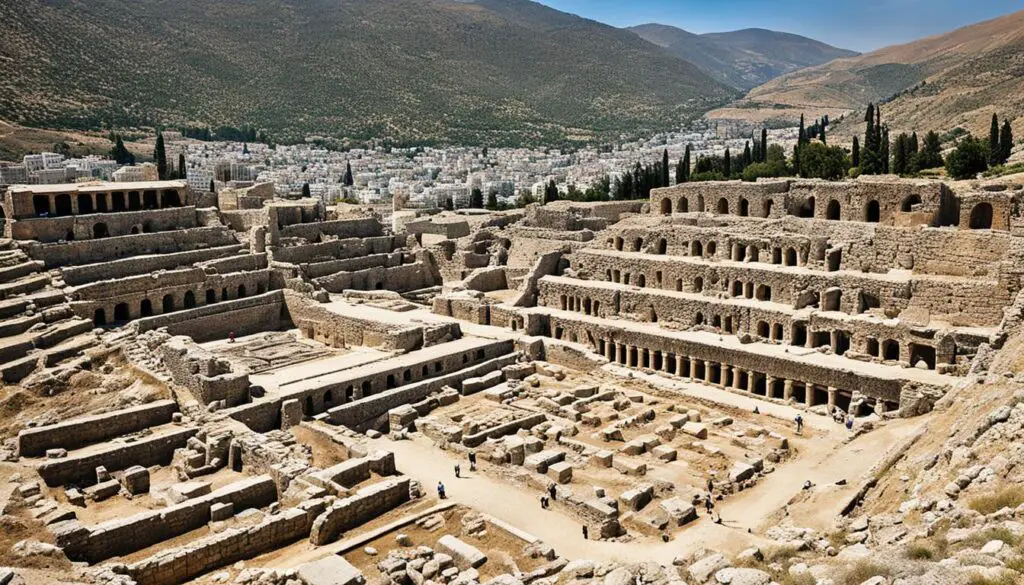
Theological Themes in Shechem
Shechem holds theological significance in the Bible as it serves as a backdrop for several important biblical themes. The city embodies a place of encounter and revelation from God to the patriarchs, playing a crucial role in the unfolding of divine plans. Throughout the biblical narrative, Shechem represents both a physical and symbolic space where God’s promises and covenants are made manifest.
One of the key theological themes associated with Shechem is the establishment of God’s covenant with Abraham. In Genesis 12, we witness God’s call to Abraham to leave his homeland and travel to a land that He would show him. Abraham, obedient to God’s command, makes a pit stop in Shechem, where God appears to him and reiterates His promise to bless him and his descendants.
Furthermore, Shechem serves as the stage for the trials and tribulations faced by Jacob and his family. The biblical account in Genesis 34 highlights the aftermath of the incident between Dinah, Jacob’s daughter, and Shechem, the prince of the city. This incident raises profound theological questions about justice, revenge, and the consequences of sin. Jacob’s sons ultimately take matters into their own hands, seeking retribution for their sister’s violation.
“And Jacob said to Simeon and Levi, ‘You have brought trouble on me by making me stink to the inhabitants of the land, the Canaanites and the Perizzites. My numbers are few, and if they gather themselves against me and attack me, I shall be destroyed, both I and my household.'” – Genesis 34:30
Shechem thus becomes a backdrop for exploring themes of justice, the consequences of actions, and the complex relationship between humanity and divine providence.
Although Shechem’s theological significance extends beyond the specific events mentioned above, it is evident that the city plays a crucial role in the biblical narrative. Shechem serves as a reminder of the spiritual realities present throughout the biblical text, reminding readers of the intricate interplay between human actions and divine purposes.
Key Biblical Events in Shechem
Shechem, with its historical significance and strategic location, was the backdrop for several significant biblical events that shaped the narrative of God’s plan for humanity. Let’s explore some of these key events:
1. Abraham’s Arrival and Covenant
One of the earliest recorded events in Shechem is Abraham’s arrival in the land of Canaan. In Genesis 12:6-7, it is mentioned that Abraham traveled to Shechem, where God appeared to him and confirmed the covenant, promising to give the land to his descendants. This encounter marked the beginning of Abraham’s journey and set the stage for the future of the Israelite nation.
2. Jacob’s Settlement and Dinah’s Incident
Shechem played a pivotal role in Jacob’s story. After returning from Paddan Aram, Jacob settled near Shechem (Genesis 33:18). It was in this vicinity that his daughter Dinah was abducted and raped by Shechem, the son of Hamor, the ruler of the city (Genesis 34:1-2). This event led to Jacob’s sons Simeon and Levi taking revenge on the inhabitants of Shechem (Genesis 34:25-29).
3. Joseph and His Brothers
Shechem is also connected to the story of Joseph, Jacob’s favorite son. In Genesis 37:12-14, we learn that Joseph’s brothers were tending their father’s flocks near Shechem. Later, Joseph’s brothers sold him into slavery, leading to his eventual rise to power in Egypt (Genesis 37:28). This event set in motion the fulfillment of God’s plan and the reconciliation of Joseph with his brothers.
4. Jesus and the Samaritan Woman
Centuries later, Shechem became the setting for an encounter between Jesus and the Samaritan woman at Jacob’s Well. In John 4:4-42, Jesus engaged in a transformative conversation with the Samaritan woman, revealing Himself as the Messiah. This encounter highlighted the universality of God’s message and the breaking down of cultural and religious barriers.
“…the water that I will give will become in them a spring of water welling up to eternal life.”
-Jesus to the Samaritan woman (John 4:14)
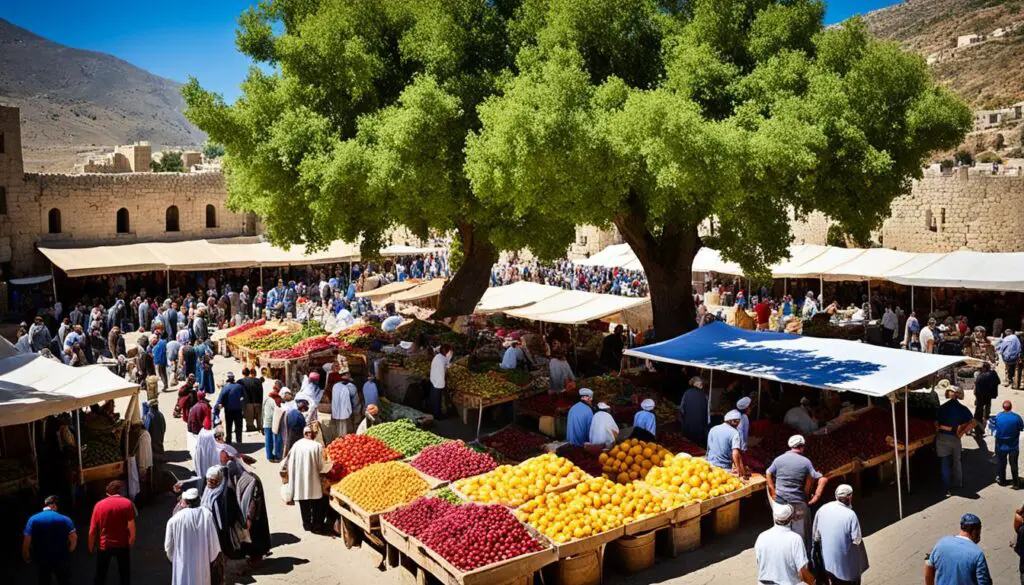
| Event | Biblical Reference |
|---|---|
| Abraham’s Arrival | Genesis 12:6-7 |
| Jacob’s Settlement | Genesis 33:18 |
| Dinah’s Incident | Genesis 34:1-2 |
| Joseph and His Brothers | Genesis 37:12-14, 37:28 |
| Jesus and the Samaritan Woman | John 4:4-42 |
These events in Shechem demonstrate the significant role that this ancient city played in biblical history. From Abraham’s covenant to the transformative encounter between Jesus and the Samaritan woman, Shechem’s narrative continues to inspire and remind us of God’s plan for redemption and reconciliation.
Cultural and Religious Practices in Shechem
Shechem was not only a city of historical and theological significance but also a center for cultural and religious practices. The Canaanite inhabitants of Shechem had their own religious beliefs and rituals, which were likely influenced by the surrounding Canaanite culture. The city’s prominence in trade and commerce would have also exposed its residents to diverse cultural influences.
“The archaeological discoveries at Tel Balata have provided valuable insights into the material culture and religious practices of the ancient residents of Shechem,” says Dr. Sarah Thompson, an expert in biblical archaeology. “We have found evidence of sacred sites, cultic objects, and ritual practices that give us a glimpse into the religious life of the Canaanites in Shechem.”
One notable aspect of Shechem’s religious practices was its association with the worship of various deities, such as Baal and Asherah, which were common in Canaanite religious traditions. Temples and altars dedicated to these gods have been discovered at the archaeological site, indicating the importance of these religious observances to the ancient residents.
The city’s cultural practices were likely shaped by its position as a hub of trade and commerce. Shechem served as a meeting point for different cultures and peoples, which would have contributed to a vibrant exchange of customs, traditions, and artistic expressions.
To gain further insight into the cultural practices of ancient Shechem, archaeologists have examined artifacts found at the site. These include pottery, jewelry, and other objects that provide clues about the daily life, social structure, and artistic achievements of the ancient inhabitants.
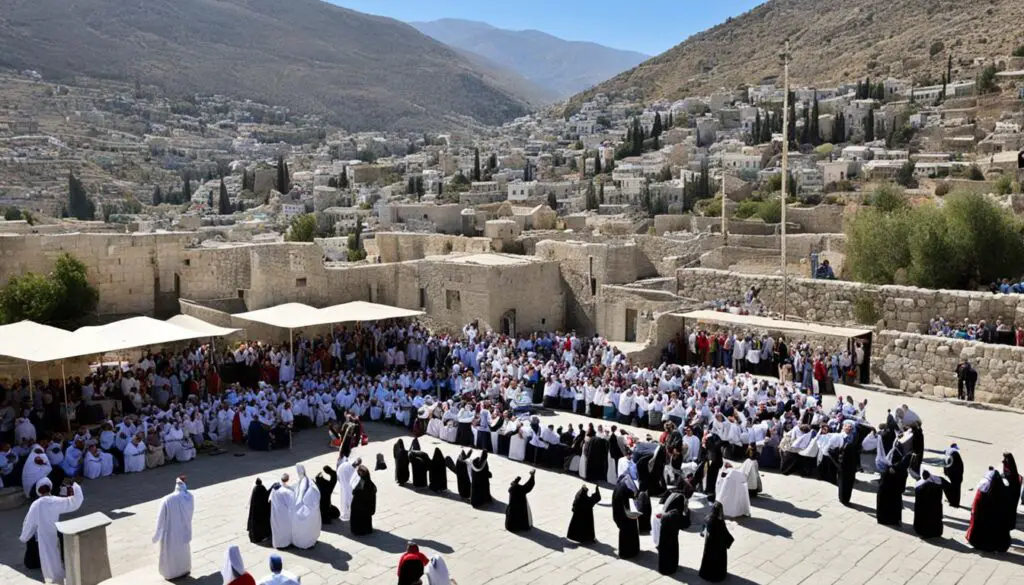
Prophetic and Eschatological Significance of Shechem
Shechem, an ancient city mentioned numerous times in the Bible, has captured the attention of scholars due to its potential prophetic and eschatological significance. In certain interpretations of biblical prophecy, Shechem is believed to play a role in future events, specifically regarding the restoration of Israel and the establishment of God’s kingdom. While interpretations may vary, the mention of Shechem in biblical prophecy highlights its enduring relevance and symbolic importance in the broader narrative of God’s plan for humanity.
Throughout history, Shechem has witnessed significant events and held a central place in biblical stories. Its prophetic and eschatological significance adds another layer to its historical and spiritual importance. As believers explore the rich history and theological themes associated with Shechem, they are reminded of the divine purpose behind the city’s existence and its potential future role.
“The mention of Shechem in biblical prophecy underscores the continuing relevance and symbolic importance of the city in the broader narrative of God’s plan for humanity.”
The Future Role of Shechem in Bible Prophecy
While interpretations of biblical prophecy regarding Shechem may vary, some common themes and ideas have emerged. The future role of Shechem in Bible prophecy is often connected to the restoration of Israel and the establishment of God’s kingdom on earth. This city, with its historical and biblical significance, holds the potential to play a part in the fulfillment of God’s ultimate plan.
One possible interpretation suggests that Shechem could serve as a gathering place for the tribes of Israel in the future. As the restored nation of Israel converges on this historic site, it could signify a significant turning point in the prophetic timeline. Shechem’s position as a strategic location and its rich biblical heritage make it a compelling choice for such a gathering.
Furthermore, Shechem’s association with the patriarchs, such as Abraham and Jacob, lends credence to the belief that it could play a role in the fulfillment of God’s covenant promises. Just as Shechem served as a place of encounter and revelation in the past, it may continue to serve as a focal point for divine intervention and the fulfillment of God’s promises in the future.
It is important to note that interpretations of Shechem’s future role in Bible prophecy are speculative and should be approached with caution. The biblical text provides glimpses into the future, but the specifics are often veiled in symbolic language and require careful study and discernment.
The Symbolic Significance of Shechem
Beyond its potential future role, Shechem holds significant symbolic value within the biblical narrative. As a city associated with both blessings and challenges, it serves as a reminder of the complexities of faith and humanity’s relationship with God.
Shechem’s history of deceit, violence, and consequences highlights the consequences of sin and the need for redemption. The stories of Dinah, Jacob, and Joseph remind us of the far-reaching impact of our actions and the importance of seeking reconciliation and forgiveness.
On the other hand, Shechem’s inclusion in the biblical promises and prophecies speaks to the power of God’s grace and redemption. Despite its troubled past, Shechem represents the potential for transformation and the restoration of brokenness. It serves as a testament to God’s ability to work through imperfect circumstances and individuals to accomplish His divine purposes.
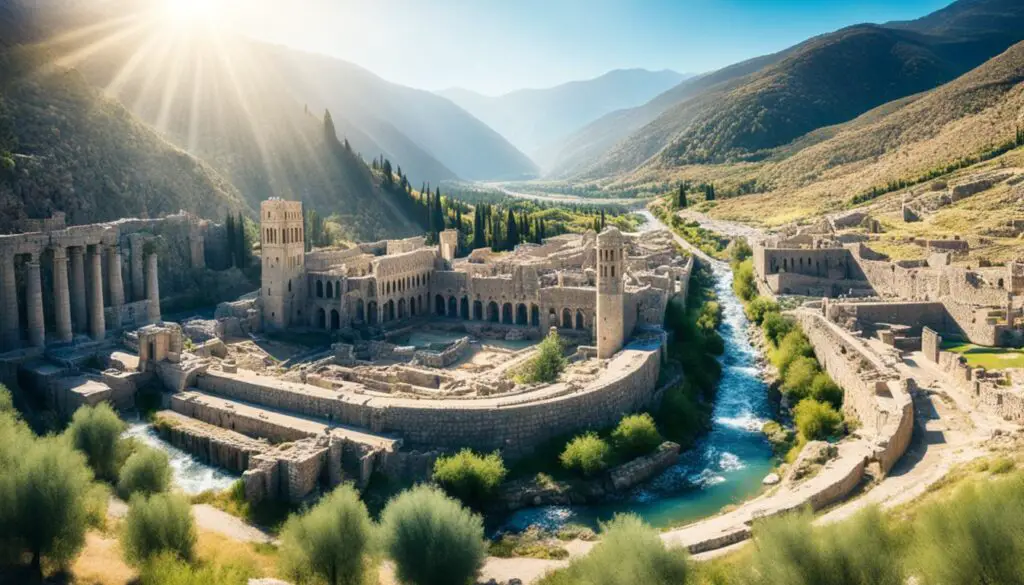
| Prophecies and Symbols Associated with Shechem | Meaning and Interpretation |
|---|---|
| Restoration of Israel | Shechem may play a role in the gathering and restoration of the twelve tribes of Israel in the future. |
| Divine Promises | Shechem’s history as a place of encounter with God underscores its potential as a site where God’s covenant promises are fulfilled. |
| Redemption and Reconciliation | Shechem’s stories of brokenness and restoration serve as a reminder of God’s ability to transform and reconcile. |
Shechem in Modern Times
While the ancient city of Shechem no longer exists, its legacy lives on in the modern-day city of Nablus, located near the archaeological site of Shechem. Nablus is a vibrant city known for its rich cultural and historical heritage. It continues to be a significant center for the Samaritan community, preserving their traditions and customs.
Nablus is a testament to the enduring historical and spiritual significance of Shechem. Its ancient roots and biblical associations attract tourists and scholars seeking to explore the fascinating history of the region. Visitors can delve into the past by exploring the archaeological remains and visiting prominent sites such as Jacob’s Well.
“Nablus is like a living bridge between the modern and ancient worlds. Its vibrant atmosphere and historical treasures allow us to connect with the stories and traditions that have shaped this region for millennia.”
Today, Nablus stands as a thriving city, offering a blend of old and new. It boasts bustling markets, where locals and visitors alike can experience the vibrant colors, flavors, and fragrances of Palestinian culture. Nablus also serves as a hub for education and commerce in the region, contributing to the growth and development of the community.
Cultural and Historical Attractions in Nablus
Nablus offers a wealth of cultural and historical attractions for visitors to explore. Here are some highlights:
- The Old City: Step back in time as you wander through the narrow alleys of Nablus’ well-preserved Old City. Marvel at the traditional architecture, visit centuries-old mosques, and discover hidden treasures in the vibrant markets.
- An-Nasr Mosque: Admire the beautiful architecture of An-Nasr Mosque, a landmark in Nablus. This centuries-old mosque holds religious and historical significance for the local community.
- Traditional Soap Factories: Get an insight into the centuries-old tradition of soap-making in Nablus by visiting one of the traditional soap factories. Learn about the production process and witness the craftsmanship behind this iconic local product.
No visit to Nablus would be complete without sampling the city’s delectable cuisine. Indulge in traditional Palestinian dishes like maqluba, musakhan, and knafeh.
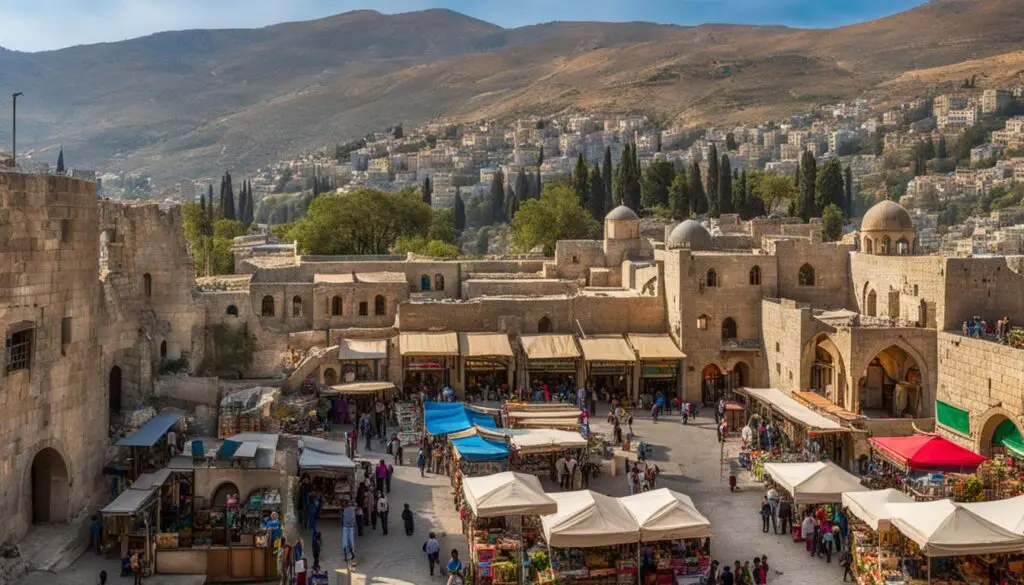
Immerse yourself in the rich history and vibrant culture of modern-day Shechem, now known as Nablus. Discover the remnants of its ancient past while experiencing the warmth and hospitality of its people. Nablus welcomes you to explore the enchanting legacy of Shechem that continues to thrive in the modern era.
Conclusion
Shechem holds a special place in biblical history, with its historical significance, geographical location, and key events making it an important city in the narrative of God’s plan for humanity. Situated in the southern Levant, Shechem played a pivotal role in the lives of Abraham, Jacob, and the Israelites, as documented in the Bible. The city’s location between Mount Ebal and Mount Gerizim made it a strategic trade center and a natural seat of government for the region north of Jerusalem.
Archaeological excavations at Tel Balata, the site of ancient Shechem, have unearthed fascinating evidence of the city’s existence. Discoveries such as fortifications, temple structures, and artifacts from different periods give us valuable insights into the lives and practices of its inhabitants throughout history. These findings corroborate the biblical accounts and affirm the historical authenticity of Shechem.
Shechem’s significance extends beyond its historical and geographical aspects. The city holds profound theological themes and prophetic implications. It is a place where God made promises and revealed Himself to the patriarchs, tying it to the greater biblical narrative. Shechem serves as a backdrop for stories of redemption, justice, and divine encounters, showcasing the timeless relevance of its spiritual lessons.
Though the ancient city has faded into history, its legacy endures. Present-day Nablus, located in the vicinity of Shechem, continues to be a center of cultural heritage and draws visitors interested in exploring its biblical roots. Shechem in the Bible encapsulates a rich tapestry of events, discoveries, and spiritual lessons that continue to resonate with believers today, reminding us of the enduring importance of this ancient city.


